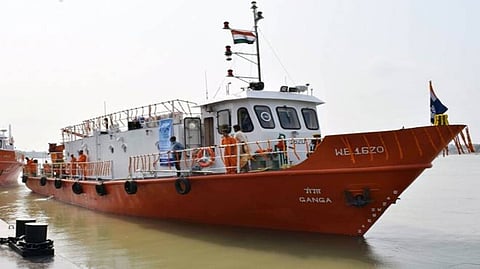
- Home
- Live Blog
- Breaking News
- Top Headlines
- Cities
- NE News
- Sentinel Media
- Sports
- Education
- Jobs

India’s ambitious target of reducing the carbon intensity of its fleets of inland water-based transport by 30% of its current level by 2030 will require states to make efforts to convert at least 50% of their current fleet to run on green fuel by 2033. Apart from the fleet of the Inland Water Transport (IWT) department, a large number of semi-mechanised boats that run on fossil fuel make Assam a key stakeholder in the national goal. As a large number of private semi-mechanised boats in the state are still not registered, the state risks missing critical decarbonisation goals in the inland water transport sector. Aligning the Jibondinga scheme initiated by the state government, which is anchored on the primary goal of improving the safety of the semi-mechanised country, with the decarbonisation goals can help achieve both. The Harit Nauka Guidelines launched by the Ministry of Ports, Shipping & Waterways in January 2024 provide the framework for the transition to green-fuel-run IWT vessels and mechanised country boats. The guidelines envision a 70% transition of the entire IWT transport fleet, including semi-mechanised boats in the country, by 2047, for which meeting the first important milestone of 30% by 2030 is highly crucial for the transformative change. The framework of transitioning to green fuels is based on the scientific facts that petrol and diesel boats release unburnt fuel, oil, and exhaust emissions, including hydrocarbons, carbon monoxide, and nitrogen oxides, into water bodies, which harm aquatic life, while noise pollution from their operation disrupts birds and their breeding and foraging. The Ministry of Shipping, in August 2023, amended its shipbuilding subsidy policy, granting a 20% subsidy to solar electric boats measuring 12 metres or more in length in addition to a 30% subsidy for boats using green fuels like methanol, ammonia, and hydrogen. The Inland Waterways Authority of India (IWAI) steering towards a phased transition from fossil fuel-based vessels to clean propulsion systems, including electric, solar-powered, and hybrid propulsion boats, demonstrates the push towards green fuel in the IWT sector. Assam having a large network of rivers comprising the Brahmaputra and Barak and their tributaries, inland water transport plays a crucial role by ferrying passengers and goods and is a cheaper mode of transport for a large section of the population. Private semi-mechanised boats account for the majority share of the traditional water transport in the state used in commercial passenger services besides trade and commerce. Increasing safety and reliability is as important as improving professionalism to transform it into a sustainable mode of transport. Viewed from this critical aspect, the Jibondinga scheme must not be seen as a mere subsidy scheme but as a timely and transformative intervention to mainstream the IWT system as a modern, indispensable but deeply trustworthy, and climate-resilient transport system. Expeditious enforcement of registration of every single boat that plies in the state under the scheme needs to be prioritised. Building awareness among passengers and traders dependent on semi-mechanised boats about the importance of registering the boats for their safety and replacing unsafe engines, which are often repurposed engines of motor vehicles or agricultural pumps, with safer marine engines can help put pressure on boat owners who are yet to register their boats. Registration of all semi-mechanised private boats will facilitate better inspection of their safety standards, enforcement of safety protocols by the IWT department, and strengthening of the oversight mechanism. The recurrence of boat accidents is a grim reminder that without bringing the sector, which is dominated by informal operations of semi-mechanised boats by private operators, under a regulatory oversight, the safety protocols will only remain in guidelines, standard operating procedures, and other official schemes and projects. Transformation of the state’s IWT sector into a formal sector with 100% registration of all vessels and semi-mechanised boats will provide the required springboard for implementation of the state action plans prepared under the Harit Nauka Guideline. The guidelines envisage that all central and state government agencies shall make incentivised endeavours to retrofit existing vessels or purchase/procure new vessels with technology for propulsion on green fuels. Creating the infrastructural ecosystem simultaneously with the conversion of the propulsion system of IWT vessels and semi-mechanised boats will be vital to ensure that the availability of alternative fuels does not jeopardise the crucial transport system. Lessons must be learnt from the practical challenges faced in decarbonising road transport through replacement of fossil-fuel-run vehicles with electric vehicles due to inadequacy in charging infrastructure. The state action plan for implementation of the Harit Nauka guidelines addressing these foundational gaps will be a key determinant for the pace of transition of inland water vessels to green fuels. Winning the trust of key stakeholders—the owners of the private vessels and semi-mechanised boats—through a decentralised and simplified registration procedure free from bureaucratic red tape is essential to create the ecosystem for a green transition. Making the IWT sector safe and climate resilient are important interdependent goals for sustainability.